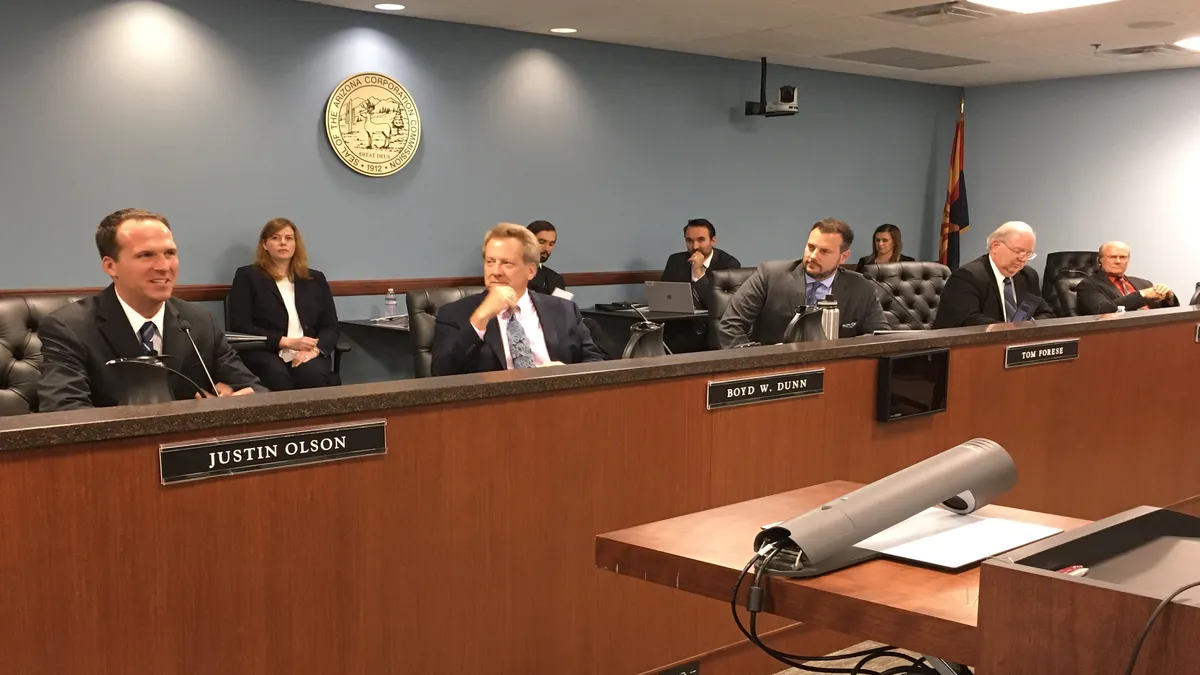Dive Brief:
- The Arizona Corporation Commission is holding a two-day open meeting beginning Tuesday, to discuss introducing competition into the state's retail electric market. Similar discussions were held five years ago but failed to produce changes.
- ACC staff have proposed rule changes that could allow community choice aggregation of municipalities and competition for larger loads, but at least one regulator wants the state to move more aggressively on retail competition.
- Commissioner Justin Olson wants to allow households to choose energy providers, and envisions a future where incumbent utilities provide only transmission and distribution services.
Dive Insight:
Arizona Public Service, the state's largest utility, says electric competition is "not in the best interest" of its customers.
Regulators considered retail electric competition years ago, but debates "stalled out" in 2013, according to the Arizona Capitol Times. Olson has made headlines since joining the commission in 2017, and now says he would like to see a vote on competition before the end of the year.
Olson was appointed to the ACC in 2017 by Gov. Doug Ducey, R, and was reelected to his seat last year. In a letter to the other commissioners and staff, he said the current proposal at the center of today's and tomorrow's discussion represents a "modest increase in energy choice for some commercial customers," but said he wants the commission to go further.
"It is time to address whether there is any justification for continuing the monopoly system in a time when technology allows for a healthy, robust and reliable market," Olson said in his July 23 letter.
Olson said along with incumbent utilities providing only transmission and distribution services, he envisions ACC-licensed energy service providers competing to serve residential and commercial customers, while the state either joins or forms a regional transmission organization (RTO).
Olson also said he wants to continue the state's moratorium on self-built utility generation for any facilities 150 MW or larger.
"The idea behind the moratorium is to require the utilities to come to the Commission for authorization to move ahead with any major projects prior to making significant investments in long term assets that could become stranded if the Commission moves forward with retail competition," Olson told Utility Dive in an email.
"I would love for the Commission to be prepared to vote on retail competition before the end of the year."
Olson, a former member of the Arizona House of Representatives, vowed to support enforcing subpoenas related to APS political contributions and was the lone vote against the commission's electric vehicle efforts, which he says will raise customer rates.
APS filed its comments July 25, responding to Olson's letter and staff's proposal. Both, the utility said, would "represent a significant shift in state policy."
"A number of innovations in the energy marketplace are occurring," APS said, pointing to the western Energy Imbalance Market which is helping utilities save money and integrate more renewables. Moving to retail competition, APS said, would require exiting the EIM and moving the state into an RTO structure.
"Any move toward retail electric competition must consider how the benefits of the current system, current innovations and clean energy policy initiatives would be impacted," APS wrote. The utility also said Olson's ideas and the staff proposal do not take into account reliability, "nor identify who would have responsibility for resource adequacy."














